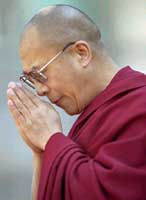Meditating on the mind
By Nicole Neroulias, Inside Bay Area, Nov 3, 2005
Science, spirituality merge for Dalai Lama's Stanford visit
San Francisco, USA -- What can a simple Buddhist monk teach neuroscientists about the human brain? Plenty, say hundreds of Bay Area medical researchers and scholars eagerly awaiting tomorrow's arrival of the 14th Dalai Lama, the exiled leader of Tibet.
 The Dalai Lama will lead three discussions on meditation and the mind Friday and Saturday at Stanford University, hosted by the Office for Religious Life, the Aurora Forum, the Center for Buddhist Studies and the School of Medicine.
The Dalai Lama will lead three discussions on meditation and the mind Friday and Saturday at Stanford University, hosted by the Office for Religious Life, the Aurora Forum, the Center for Buddhist Studies and the School of Medicine.
The ancient Buddhist tradition of intense meditation has much to offer neuroscience, while Western research can test the mental states achieved through its practice, explained William Mobley, director of the medical school's Neuroscience Institute.
"Both cultures see brain function as important, and both are informed by observations," he said.
Exchanging information
Although best known for his teachings on compassion and non-violence, the Dalai Lama has always enjoyed talking with scientists, particularly about the origin of the universe, said Tenzin Tethong, Dalai Lama Foundation president and a visiting lecturer on Tibetan history at Stanford.
"Of course, people often think he's trying to convert scientists to Buddhism, but I don't think the Dalai Lama has an agenda," he said. "He's interested in science and at the same time he's trying to share Buddhist views about the nature of mind and consciousness. That's at the heart of what neuroscientists are trying to do - understand how the brain works."
The 70-year-old religious leader's public interest in neuroscience has stirred up national controversy, with more than 500 researchers signing a petition against his upcoming Washington D.C. lecture to the Society for Neuroscience. However, the only complaints registered by his Peninsula visit concern the shortage of tickets.
After several failed attempts to gain admission, Diarmuid Rooney, director of the Mercy Center in Burlingame, said staff at the Catholic-based meditation and spiritual retreat site are resigned to watching the events on the Internet. His own disappointment is alleviated by his cherished memory of attending the Dalai Lama's visit to Ireland 10 years ago.
"They have an expression in Buddhism, called 'Dharma' - the truth. 'Dharma Rain' means being in the presence of someone holy. Just being in their presence alone is a gift and a grace," he said.
Ocean of wisdom
Buddhism began 2,500 years ago in India, when a wealthy young man abandoned his possessions in search of the meaning of life and became the Buddha, the enlightened one. Buddhists believe life is filled with suffering, which can be alleviated through meditation and self-control.
Born to a peasant family in Tibet, Tenzin Gyatso was only a toddler when he was recognized as the reincarnation of his predecessor, the 13th Dalai Lama. The Dalai Lama, which means Ocean of Wisdom, is the manifestation of the Buddha of Compassion.
After a failed 1959 uprising against Chinese occupying forces, the Dalai Lama fled with 80,000 Tibetans to Dharmsala, India.
He has spent the ensuing decades preaching non-violence and preserving his country's language, history and culture.
The 1989 Nobel Peace Prize winner, known as His Holiness to his followers, has authored numerous books on spirituality, meditation and peace, including the 1998 best-seller "The Art of Happiness: A Handbook for Living" and the September release, "The Universe in a Single Atom: The Convergence of Science and Spirituality."
Event details
When the Dalai Lama visited Stanford in 1994, tickets were available only to students, faculty and staff. Loudspeakers were set up in the Quad for non-ticket holders to hear the address.
This time, the events will be broadcast live on KZSU-FM (90.1) and at http://dalailama.stanford.edu/video, where the footage will remain archived for later viewing.
From 9:30 to 11:30 a.m. tomorrow, the Dalai Lama will lead a meditation session and answer questions at Maples Pavilion for "Meditation and Teaching by the Dalai Lama."
From 2:30 to 4:30 p.m. tomorrow, he will be hosted by the Aurora Forum in Memorial Church for "The Heart of Nonviolence: A Conversation with the Dalai Lama."
From 10 a.m. to 4:30 p.m. Saturday, the School of Medicine will host a dialogue between the Dalai Lama, neuroscientists from Stanford and other universities, and Buddhist scholars at Memorial Auditorium on "Craving, Suffering and Choice: Spiritual and Scientific Explorations of Human Experience."

 The Dalai Lama will lead three discussions on meditation and the mind Friday and Saturday at Stanford University, hosted by the Office for Religious Life, the Aurora Forum, the Center for Buddhist Studies and the School of Medicine.
The Dalai Lama will lead three discussions on meditation and the mind Friday and Saturday at Stanford University, hosted by the Office for Religious Life, the Aurora Forum, the Center for Buddhist Studies and the School of Medicine.